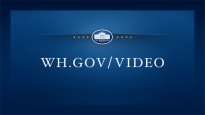SAVE Award and Government Efficiency
December 21, 2009 | 10:06
President Obama speaks about making government more efficient and effective after meeting with Nancy Fichtner, a VA employee whose idea to let patients take home unused medication won the inaugural SAVE Award. December 21, 2009. (Public Domain)
Remarks by the President on the SAVE Award and Making Government More Efficient and Effective
11:21 A.M. EST
THE PRESIDENT: Hello, everybody. Good morning. Before I begin, I want to say a brief word about the historic vote which took place early this morning. The United States Senate knocked down a filibuster aimed at blocking a final vote on health care reform, and scored a big victory for the American people. By standing up to the special interests -- who've prevented reform for decades and who are furiously lobbying against it now -- the Senate has moved us closer to reform that makes a tremendous difference for families, for seniors, for businesses, and for the country as a whole.
For those who have insurance, reform will mean greater security and stability. No longer will people with preexisting conditions be excluded from coverage. No longer will people who are seriously ill be dropped from coverage. And no longer will families be allowed to go broke because they’re forced to pay exorbitant out-of-pocket expenses.
Many people recall the enormous fights around the Patient's Bill of Rights that never got done. Well, you know what, the Patient's Bill of Rights is embedded in this health care bill and -- to make sure that all Americans who have insurance right now are getting a fair deal from their insurance companies.
Small businesses and those who don’t get insurance through their employer will finally be able to get insurance at a price that they can afford with tax credits to help. And Medicare will be stronger and its solvency extended by nearly a decade. Seniors will get more assistance with prescription drug costs than they're getting right now. And finally, these reforms will help the inexorable and unsustainable rise in health care costs that are overwhelming families, businesses, and the federal budget.
The Congressional Budget Office now reports that this bill will reduce our deficit by $132 billion over the first decade, and by as much as $1.3 trillion in the decade after that. So I just want to be clear, for all those who are continually carping about how this is somehow a big spending government bill, this cuts our deficit by $132 billion the first 10 years, and by over a trillion in the second. That argument that opponents are making against this bill does not hold water.
Now, embracing this kind of responsibility in Washington is what also brings us here today. I am pleased to be joined this morning by my Secretary of Veterans Affairs, Ric Shinseki; my budget director, Peter Orszag; and our special guest, last but not least, the winner of the first annual SAVE Award -- and that's Nancy Fichtner of Loma, Colorado.
Having met with Nancy a few minutes ago, I can tell you Nancy means business. She is a single working mom; she's a clerk with the VA; she's an artist; she's an outdoorswoman; and she is an avid hunter. In fact, somewhere in the western United States, there is an elk that is breathing a sigh of relief because Nancy is here instead of where she would have been: hunting with her kids. (Laughter.) And I believe her children are here -- where's Nancy's kids? There they are right there. It's great to see you guys. Nancy's daughter -- she skins and guts her elk, so don't mess with her either. (Laughter.)
We're all here for a simple reason. At a time when we face not only a fiscal crisis, but also a host of difficult challenges as a nation, business as usual in Washington just won't cut it. We need a government that's more efficient, that's more effective, and far more fiscally responsible.
When my administration walked through the door, the country faced a growing economic downturn as well as a deepening fiscal hole. Washington had passed massive tax cuts for the wealthy and an expensive new entitlement program without paying for any of it. Health care costs continued to rise, year after year. And little effort was made to cut wasteful spending. As a result, over the previous eight years, the national debt doubled -- doubled. In January, the deficit stood at $1.3 trillion. And we had to make the difficult decision to add to the deficit in the short term to prevent the potential collapse of our economy.
But as I've said, in the long run, we can't continue to spend as if deficits don't have consequences; as if waste doesn't matter; as if the hard-earned tax dollars of the American people can be treated like Monopoly money. That's what we've seen time and time again. Washington has been more concerned about the next election than the next generation. It's put off hard choices in spending bill after spending bill, budget after bloated budget.
Government contracting is a perfect example. Between 2002 and 2008, the amount spent on government contracts more than doubled. The amount spent on no-bid, non-competitive contracts jumped by 129 percent. This is an inexcusable waste of money. And that's why, back in March, I ordered federal departments and agencies to come up with plans to save up to $40 billion a year in contracting by 2011. And over the past six months, agencies have been making cuts by looking for better deals, by ending contracts and doing work in house, and by opening up no-bid contracts to competitive bidding. Because of these efforts, I'm proud to announce today that we are on track to meet our goals. Twenty-four departments have identified more than $19 billion in savings for this year alone.
And this is only the latest example. At my very first Cabinet meeting, I directed every secretary to join us in scouring the budget, line by line, to find ways to make government more efficient and less wasteful. Together, we identified more than 100 programs to scale back or end completely, as well as other ways to cut costs, finding $17 billion in savings so far.
We're also going after roughly $100 billion wasted on improper payments to contractors, organizations, and individuals. To put this in perspective, these mistakes, and in some cases abuses, cost taxpayers more each year than the budgets for the Education and Homeland Security Departments combined.
We have done what some said was impossible: preventing wasteful spending on outdated weapons systems that even the Pentagon said it doesn't need. And I’ve insisted from the beginning that health care reform will not add one dime to our deficit. And as I just noted, not only is it not adding to our deficit, it's actually reducing it.
Finally, I’ve issued a challenge to every man and woman who works for the federal government: If you see a way that government could do its job better, or do the same job for less money, I want to know about it. That’s why we started the SAVE Award, to draw on those who know government best to improve how government works. We asked federal employees to submit reform proposals based on their experiences. And in a testament to the seriousness with which these folks are taking their jobs, we received more than 38,000 proposals in just three weeks.
From these submissions, four finalists were selected and put to an online vote. Nancy is here because she won. Her idea stems from her experience at the VA Medical Center where she works. She noticed that whenever patients left the hospital, leftover medications like eye drops or inhalers were just thrown away. And often, veterans would have to go right back to the pharmacy to refill what was discarded. So the VA is paying twice -- it’s waste, plain and simple. And thanks to Nancy -- and to Secretary Shinseki and the folks at Veterans Affairs -- we’re putting a stop to it. The change is already underway.
Of course, Nancy’s proposal was just one of many great ideas that came to us. We’ve already begun to implement a host of suggestions made through the SAVE contest. And while promoting electronic paystubs or scheduling Social Security appointments online or re-purposing unused government supplies may not be the most glamorous reforms in history, when taken together, these small changes can add up; they add up to a transformation of how government works.
And that’s why we’re going to turn the SAVE Award into an annual event. That’s why we’re holding a forum at the White House next month to seek more ideas from the private sector, specifically about how we can better use technology to reform our government for the 21st century.
After years of irresponsibility, we are once again taking responsibility for every dollar we spend, the same way families do. It’s true that what I’ve described today will not be enough to get us out of our fiscal mess by itself. We face a deficit that will take some tough decisions in the next year’s budget and in years to come to get under control. But these changes will save the American people billions of dollars. And they’ll help to put in place a government that’s more efficient and effective, that wastes less money on no-bid contracts, that’s cutting bureaucracy and harnessing technology, that’s more fiscally responsible, and that better serve the American taxpayer. That’s the government we need. That’s the government I intend to implement. That's the kind of government that the American people deserve. And that’s the kind of government that people like Nancy are helping to build each and every day.
So, Nancy, congratulations. We're proud of you. Thank you so much. Thank you. We're very proud of your mom. (Laughter.) That's great.
Thank you, everybody.
END
11:31 A.M. EST
|
December 16, 2016
|
December 16, 2016
|
December 15, 2016
|
December 15, 2016
|
|
December 15, 2016
|
December 14, 2016
|
December 14, 2016
|
December 14, 2016
|
- &lsaquo previous
- 1
- 2
- 3
- 4
- 5
- 6
- 7
- 8
- 9
- …
- next &rsaquo







